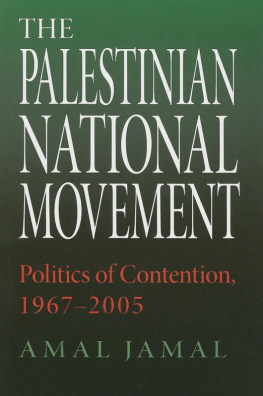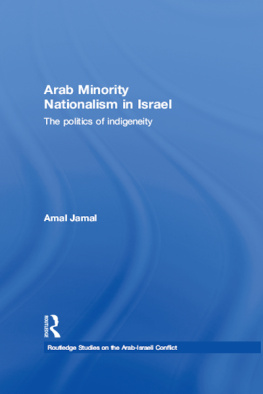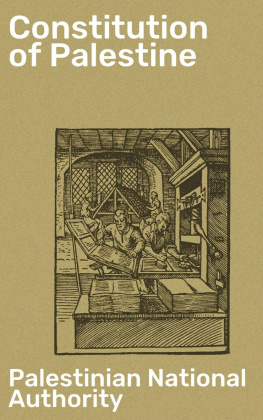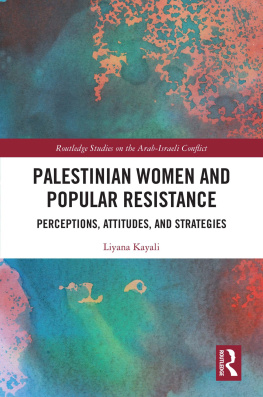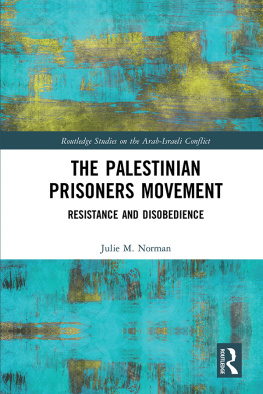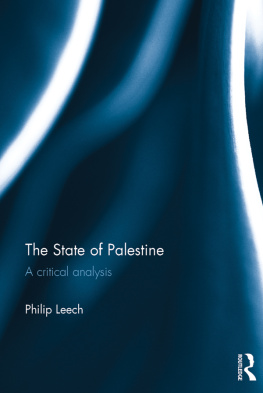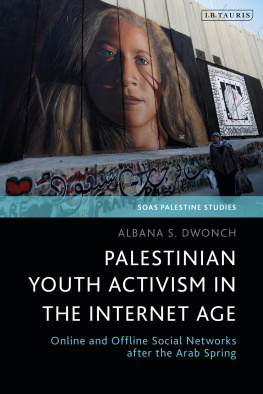Amal Jamal - The Palestinian National Movement: Politics of Contention, 1967-2005
Here you can read online Amal Jamal - The Palestinian National Movement: Politics of Contention, 1967-2005 full text of the book (entire story) in english for free. Download pdf and epub, get meaning, cover and reviews about this ebook. year: 2005, publisher: Indiana University Press, genre: Politics. Description of the work, (preface) as well as reviews are available. Best literature library LitArk.com created for fans of good reading and offers a wide selection of genres:
Romance novel
Science fiction
Adventure
Detective
Science
History
Home and family
Prose
Art
Politics
Computer
Non-fiction
Religion
Business
Children
Humor
Choose a favorite category and find really read worthwhile books. Enjoy immersion in the world of imagination, feel the emotions of the characters or learn something new for yourself, make an fascinating discovery.
- Book:The Palestinian National Movement: Politics of Contention, 1967-2005
- Author:
- Publisher:Indiana University Press
- Genre:
- Year:2005
- Rating:4 / 5
- Favourites:Add to favourites
- Your mark:
- 80
- 1
- 2
- 3
- 4
- 5
The Palestinian National Movement: Politics of Contention, 1967-2005: summary, description and annotation
We offer to read an annotation, description, summary or preface (depends on what the author of the book "The Palestinian National Movement: Politics of Contention, 1967-2005" wrote himself). If you haven't found the necessary information about the book — write in the comments, we will try to find it.
Amal Jamal: author's other books
Who wrote The Palestinian National Movement: Politics of Contention, 1967-2005? Find out the surname, the name of the author of the book and a list of all author's works by series.
The Palestinian National Movement: Politics of Contention, 1967-2005 — read online for free the complete book (whole text) full work
Below is the text of the book, divided by pages. System saving the place of the last page read, allows you to conveniently read the book "The Palestinian National Movement: Politics of Contention, 1967-2005" online for free, without having to search again every time where you left off. Put a bookmark, and you can go to the page where you finished reading at any time.
Font size:
Interval:
Bookmark:
Mark Tessler, general editor
Bloomington & Indianapolis
601 North Morton Street
Bloomington, IN 47404-97 USA
Fax orders 812-55-931
Orders by e-mail iuporder@indiana.edu
The Palestinian national movement : politics of contention, 19672005 / [Amal Jamal].
p. cm. (Indiana series in Middle East studies)
Includes bibliographical references and index.
ISBN 0-253-34590-1 (cloth: alk. paper) ISBN 0-253-21773-3 (pbk.: alk. paper)
1. Palestinian ArabsPolitics and government20th century. 2. Munazzamat al-Tahrir al-Filastiniyah. I. Title. II. Series.
DS113.7J36 2005
320.956940899274dc22
Iyady,
and Omri
Font size:
Interval:
Bookmark:
Similar books «The Palestinian National Movement: Politics of Contention, 1967-2005»
Look at similar books to The Palestinian National Movement: Politics of Contention, 1967-2005. We have selected literature similar in name and meaning in the hope of providing readers with more options to find new, interesting, not yet read works.
Discussion, reviews of the book The Palestinian National Movement: Politics of Contention, 1967-2005 and just readers' own opinions. Leave your comments, write what you think about the work, its meaning or the main characters. Specify what exactly you liked and what you didn't like, and why you think so.

